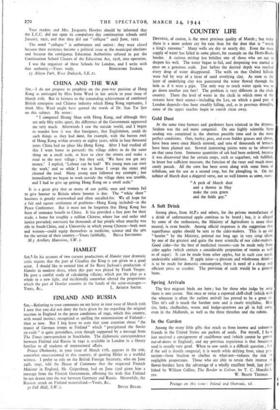COUNTRY LIFE
DRYNESS, of course, is the most precious quality of March ; but today there is a more ardent cry for rain than for the dust that is " worth a king's ransome." Many wells are dry or nearly dry. Even the main supply of water has failed in some places, for example on the Herts-Bucks border. A curious mishap has befallen one of those who set out to deepen his welL The water began to fail, and deepening was started at once on a generous scale. Just before the desired depth was reached every drop of water disappeared. The wells on that Oxford hillside were fed by way of a layer of sand overlying clay. As soon as the layer of underlying clay was punctured the water flowed through the hole as if it were a pipe. The only way to reach water again was to go down another 200 feet! The problem is very different in the chalk country. There the level of water in the chalk in which most of the streams have their source—including the Lea, on which a good part -)f London depends—has been steadily falling, and, as in previous drought,, some of the upper reaches begin to vanish clean away. DRYNESS, of course, is the most precious quality of March ; but today there is a more ardent cry for rain than for the dust that is " worth a king's ransome." Many wells are dry or nearly dry. Even the main supply of water has failed in some places, for example on the Herts-Bucks border. A curious mishap has befallen one of those who set out to deepen his welL The water began to fail, and deepening was started at once on a generous scale. Just before the desired depth was reached every drop of water disappeared. The wells on that Oxford hillside were fed by way of a layer of sand overlying clay. As soon as the layer of underlying clay was punctured the water flowed through the hole as if it were a pipe. The only way to reach water again was to go down another 200 feet! The problem is very different in the chalk country. There the level of water in the chalk in which most of the streams have their source—including the Lea, on which a good part -)f London depends—has been steadily falling, and, as in previous drought,, some of the upper reaches begin to vanish clean away.
Gold Dust
At the same time farmers and gardeners have rejoiced in the dryness. Seldom was the soil more congenial. On one highly scientific farm seeding was completed in the shortest possible time and in the most perfect conditions. Oats, barley, peas, and even fodder grasses and clover, have been sown since March entered, and tens of thousands of lettuces have been planted out. Several interesting points were to be observed on that same farm. Immense quantities of salt had been ordered, because it was discovered that for certain crops, such as sugarbeet, salt fulfilled, in lesser but sufficient measure, the function of the rarer and much more costly potash. All the corn has been sown along with some form of trifolium, not for use as a second crop, but for ploughing in. On the subject of March dust a doggerel verse, not so well known as some, runs: " A peck of March dust and a shower in May make the corn green and the fields gay."
A Soft Drink Strong pleas, from M.P.s and others, for the private manufacture of a drink of unfermented apple continue to be heard ; but, it is alleged by some of the enthusiasts, the Ministry of Agriculture is more than neutral, is even hostile. Among official responses is the suggestion that superfluous apples should be sent to the cider-makers. This is an old " howler " by the Ministry, pointed out long ago in very crisp idiom by one of the greatest and quite the most scientific of our cider-makers. Good cider—for the best of medicinal reasons—can be made only from cider apples (which contain a considerable proportion of tannin as well as of sugar). It can be made from other apples, but in such case needs undesirable additions. If apple juice—a pleasant and wholesome drink— is to be made for domestic consumption, there is need of a cheap and efficient press or crusher. The provision of such would be a general boon.
Spring Arrivals
The first migrant birds are here ; but for those who judge by song there is one caveat. Not once or twice a reported chiff-chaff (which with
the wheatear is often the earliest arrival) has proved to be a great tit. This tit's call is much the harsher note and is rarely trisyllabic. Blue tits, larks, chaffinches, wrens and hedge-sparrows are jell in full song, even in the Midlands, as well as the three thrushes and the robins.
In the Garden Among the many little gifts that reach us from known and unknown friends in the United States are packets of , seeds. For myself, I live just received a consignment of cauliflower seed (which cannot be grown out-of-doors in England), and my previous experience is that American seed is usually very good. When to sow seeds is a difficult question ; but if the soil is dustily congenial, it is worth while defying frost, since pro- tection—from bracken or cloches or what-not—reduces the risk to negligible proportions. Those who are able to retain their interest in flower-borders have the advantage of a wholly excellent book, just pub- lished by William Collins, The Border in Colour, by T. C. Mansfield,
Postage on this issue : Inland and Overseas, Id.


























 Previous page
Previous page